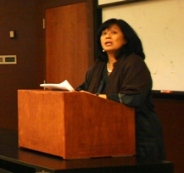Zainah Anwar Guest of Program in Comparative Legal Studies and Post-Conflict Justice

Anwar began by showing a video depicting voices from all walks of life, men and women, young and old chanting the word "Musawah!" "Change is possible," said Anwar. "Musawah is a demand for justice and an idea whose time has come."
In fact, the idea came a long time ago, said Anwar. The most progressive feminist laws of the age were introduced in the seventh century with the revelation of the Qur'an. These included a woman's right to divorce and own property. If these were the revolutionary messages of Islam, what went wrong?
"If God is just, if Islam is just, then why do laws made in the name of Islam lead to injustice?" Anwar asked. Muslim women still face severe discrimination in some countries. For example, a man can divorce his wife at will, but a wife has to go to the courts and obtain divorce on very specific grounds. Despite discriminatory practices remaining operative in many countries, a few are pushing for reform. Musawah uses these countries as examples in their arguments for equality to discriminatory governments. "If some Muslim countries can change, why can't others?" said Anwar.
"Equality is not a western, new idea," she said. "It's been around since the seventh century on papyrus!"
Musawah declared that enough is enough. The movement is a holistic, multiple-level approach towards comprehensive reform that is both necessary and possible. Necessary, said Anwar, because "current laws are unjust to women." And possible, because "equality and justice are core Islamic principles enjoined not only by international human rights and justice, but located in the Qur'an itself." As Musawah's message is carried out through scholarship, protests, and gradual reform, Anwar's hope is that those principles will become embedded in Muslim culture and identify. "Equality and justice are values that must be at the core of what it means to be Muslim today."